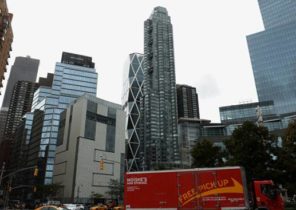In the coldest region of the world now to breathe. Located in the North of Yakutia Verkhoyansk got to the end of June on the front pages of Newspapers with a record temperature of 38°C. an Unthinkable outcome for the city, which is accustomed to record cold: -68°C in winter 1933, which allows him to compete with located in the same region, the village of Oymyakon for the title of the coldest settlement in the world.
Since the end of June, the thermometer here does not fall hard and keeps at a mark of 30 degrees. In this village with wooden houses and a population of just over 1,000 people had an unpleasant feeling that he was in the forefront of climatic disasters like tropical Islands.
“Children are happy to be able to bathe in the river Pit, which is not every year, says on the phone, the mayor of Verkhoyansk, Eugene Potapov. But people understand that this is not normal and even dangerous. Even old people have never seen anything like it, and in recent years we have received more information. In addition, we see that winter is colder, but less snow”.
In life, accustomed to the harsh climate of the local population (mainly herders and miners), little has changed, but the cattle have a hard time: the heat do not grow grass in the pastures. “If we continue further, it is difficult to imagine what will be the future,” said the mayor.
Early warming
Recent data from the European service for warming Copernicus saying recorded in Verkhoyansk record (it should confirm the world meteorological organization) — not a temporary or isolated phenomenon. Although global June temperature is comparable to the records 2019, the highest figures were registered in the Arctic regions of Siberia: the average temperature in June is more than 5 degrees higher than normal, while in some places reached +10°C. Snow cover and soil moisture show the lowest figures for June in the North of Siberia in the entire history of observations.
In addition to the records alarming as before the weather warms up. The temperature was above normal, especially in the Western part of Siberia, from December 2019 and throughout the spring. From April the thermometer rose above the level of 30°C. the meteorologist called the winter of 2019-2020 in Siberia the warmest for all history of supervision since the 1930s. “Such a high temperature for such a long time — an unusual thing for Siberia, says Frey, Lamborg of Copernicus. — However in the conditions of climate warming will be recorded new records”.
Warming in the Arctic is twice as fast as the rest of the world, because of a phenomenon called Arctic amplification: the increase in air temperature leads to the melting of snow and ice that replaces the light-reflecting white surface darker ocean or vegetation, which absorb more sunlight. A vicious circle: the increase in temperature leads to melting of ice, which further accelerates warming.
As a result, in the Russian Arctic and Siberian regions most strongly affected by extreme climatic phenomena. Along with heat come the floods and forest fires. On the past almost never heard before at these latitudes, but now they became almost commonplace during the summer.
In this plan 2019 was a Wake-up call for the whole country. Only in August, then burned 4 million acres of forest, forcing to breathe the smoke of millions of Russians (mostly in Siberia). For ten years the area of fires has doubled. In addition to high temperature the reason for this is the melting of the snow, which in summer, the vegetation becomes drier.
A slow realization
The year 2020 promises even more difficult: according to reports, since the beginning of the year have burned more than 3.7 million hectares in the same areas that were affected in 2019. In Copernicus noted that the result in June got to the atmosphere of 59 million tonnes of CO2 (53 million in June 2019), which is more than the emissions of the whole of Portugal during the whole year. The representative of the emergency services assures that firefighting has also become more efficient and includes a faster and more systematic deployment of air assets in the most remote regions, where earlier authorities considered that to extinguish the fire does not make sense.
In addition, South Siberia, fear a repetition of the catastrophic situation of 2019 in terms of flooding. Scientists also point to the rapid growth of the population of the species is extremely voracious caterpillars, which absorb huge amounts of pine needles.
Anyway, the most specific symptom of a warming climate and, probably, the main source of danger, for the most part remains unnoticeable. The melting of permafrost, which can go to a depth of one kilometer, was confirmed, and its rate of increase. “In the course of melting from warming of permafrost selects the most different was it organic substances, in particular CO2 and methane, an even more dangerous greenhouse gas,” says hydrologist Antoine Sejourne from the University Paris-Saclay, which examines the melting of the permafrost in Yakutia.
Melting permafrost amplifies global warming, which in turn contributes to the melting (especially against fire). All of this brings balance to the climate of the Arctic, and with it the world, since the North pole is considered the world conditioning.
“Awareness of the danger of climate change is very slow in Russia, especially among economic and political elite, — said Ivan Blokov of Greenpeace Russian. — Nevertheless, the question of permafrost makes you wonder first of all about what losses may result in melting”.
The threat to infrastructure
In such cities as Yakutsk, many of the buildings are on stilts because of the hardness of the soil and now can collapse. Old wooden houses are falling apart. There is a threat to infrastructure, particularly, oil and gas, 80% of which are located in permafrost zones. In early June, drop the tank and spilling fuel into the river close to Norilsk have confirmed these fears, although the exact cause of the incident has not been established.
According to Vladimir Putin, no one knows what has caused the warming, but Russia ratified the Paris agreement on climate change in September 2019. The government realizes that the potential benefits from warming (in particular the opening of the Northern sea route) may be much lower than possible losses. A certain illustration of this position was presented by the President in January a national plan for adapting the country to climate change, which should help reduce damage and take advantage of “opportunities”.





